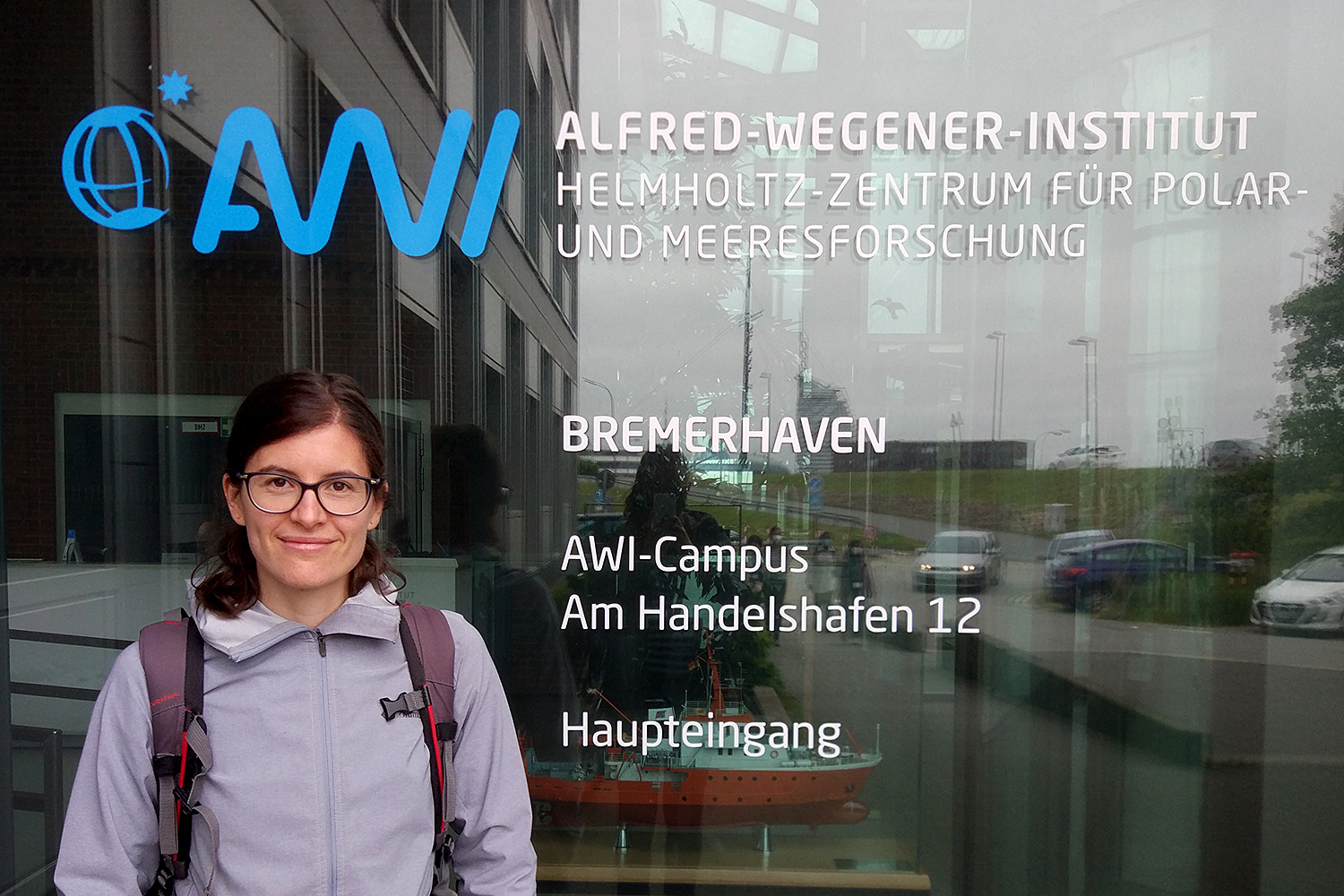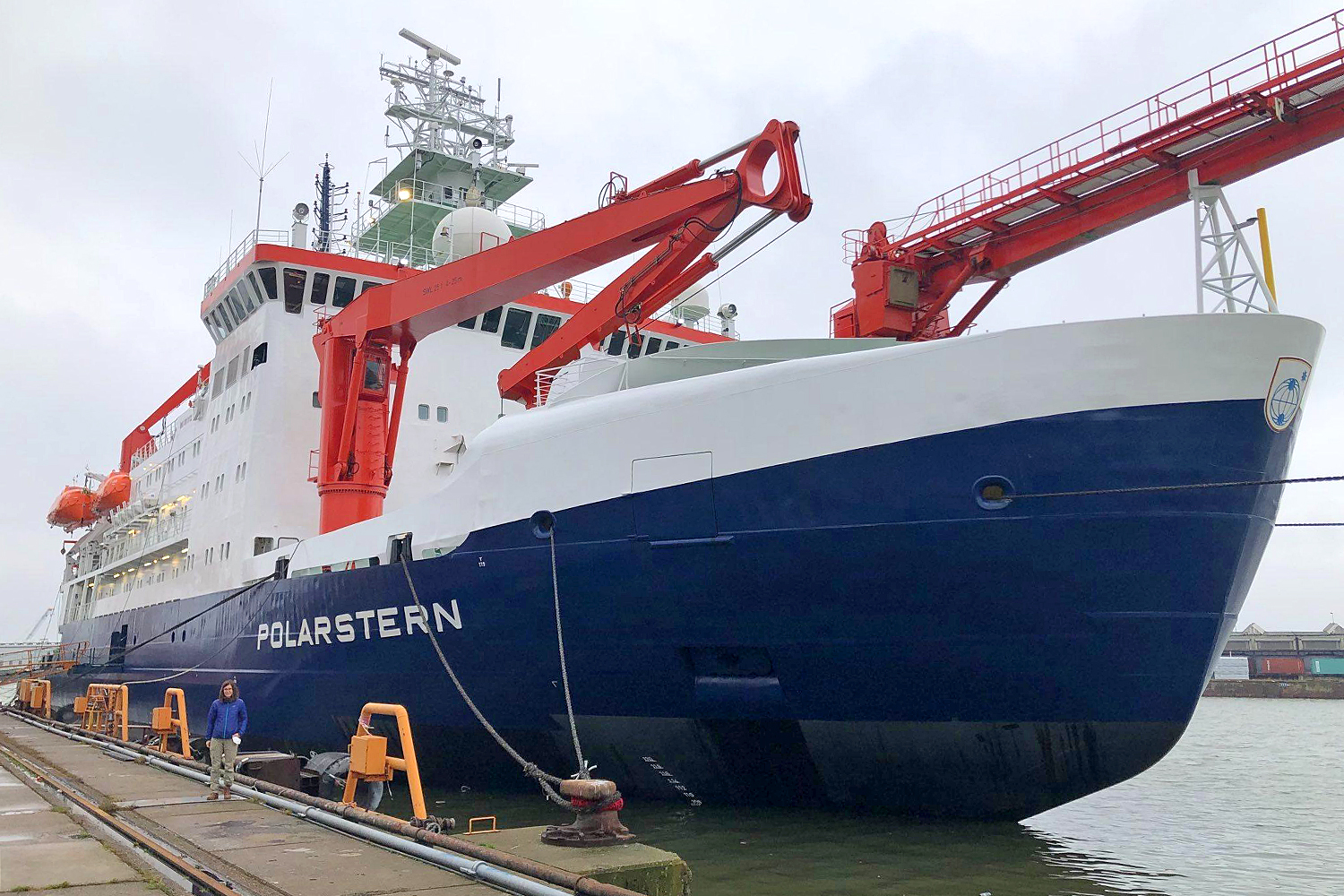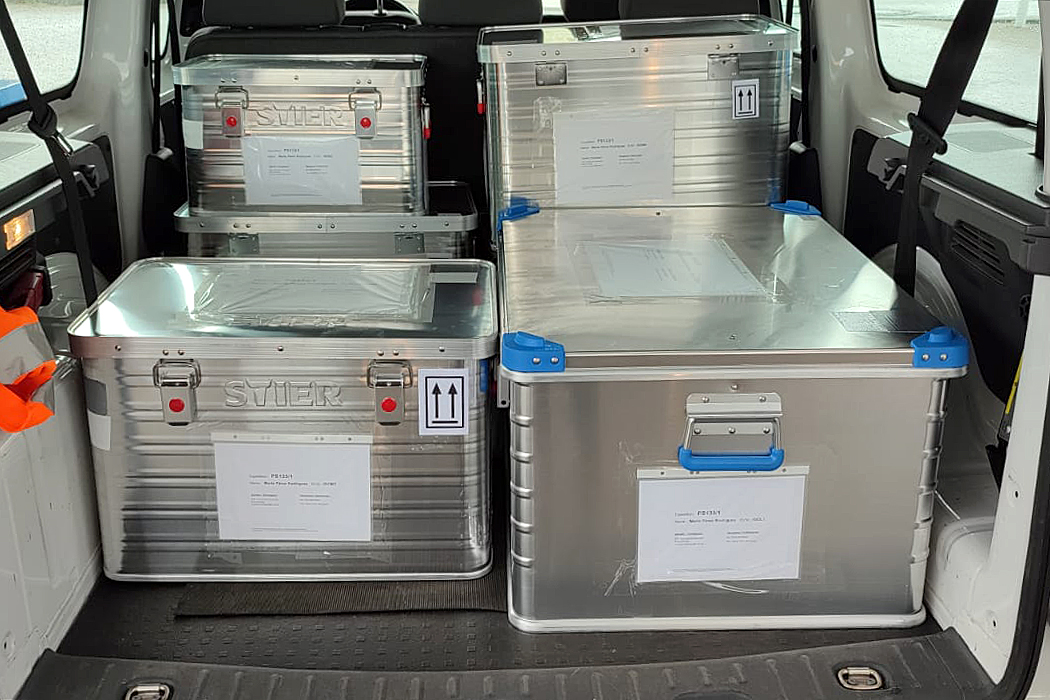Setting off on a stormy research trip Dr Marta Pérez Rodríguez on her participation in the "Polarstern" expedition to South Georgia
The “Island Impact” expedition is a dream come true for Dr Marta Pérez Rodríguez as an environmental scientist. Until mid-November 2022, the staff member of the Institute of Geoecology will be on board the research vessel “Polarstern” of the Alfred Wegener Institute, Helmholtz Centre for Polar and Marine Research (AWI). From there she will take water and sediment samples for her research on the mercury cycle. Before she went on the ship, she answered a few questions for us.

Dr Marta Pérez Rodríguez brought the cargo to the AWI in Bremerhaven back in August. Photo credit: Marta Pérez Rodríguez/TU Braunschweig
Ms Pérez Rodríguez, you have an exciting research trip ahead of you. How did you prepare for the expedition?
The preparations were indeed very extensive. For example, we had to apply for a permit for our sampling in the waters of the Falkland Islands and deal with the forms for exporting the sample material. In addition, we met with colleagues participating in the expedition and with cooperation partners to determine the methodology and number of samples, how to store them and so on. We are mainly following the so-called “Geotraces Cookbook”, an international guide for working with trace metals in the ocean provided by “Geotraces”. In a one-week “Geotraces” summer school, I also learned basics on working on board, in the lab there and taking samples. On board I will then get further training on lab procedures.
The preparation of the working material was very intense: the mercury concentrations in the open ocean are very low, so we have to work under very clean conditions. This requires long and intense cleaning protocols. As an example, the cleaning of the bottles we will use to collect methyl-mercury takes approximately twelve days and includes several steps with soaps, concentrated acids and ultra-pure water.
Of course, a complete medical check was also part of the preparations for me, as well as a fitting of on-board working clothes.
What is the aim of your research?
Our research group specialises in mercury geochemistry, mainly focused in terrestrial ecosystems, including peatlands and lacustrine systems. Since 2017, we have been investigating the role of marine primary productivity, meaning biomass production, in the accumulation of mercury in sediments. For this, we analyse marine sediment cores. In 2018, we demonstrated the importance of algae sinking – also known as ‘algae scavenging’ – as the main mechanism for mercury accumulation in Antarctic ocean sediments (Zaferani et al., 2018).
We hypothesised that the algae acted as an export vector for mercury from the water column to the sediments at the bottom. Therefore, regions with high primary productivity, such as the areas where the expedition will take place, are very likely to be relevant to the marine mercury cycle. In addition, the transport of mercury through the water column can lead to its transformation into its toxic bioavailable organic form, namely methyl-mercury. The problem is that methylmercury accumulates in the marine food chain and eventually reaches humans.
In our research we want to understand the relation between the “algae scavenging” of mercury and the formation of methyl-mercury in the water column on the one hand and the bioaccumulation in the food chain and the final accumulation in the sediments on the other hand.

In Bremerhaven, Dr Marta Pérez Rodríguez was already able to take a look at the research vessel. Now she is setting off with the “Polarstern” from Cape Town towards the South Atlantic. Photo credit: Marta Pérez Rodríguez/TU Braunschweig
Why is this expedition important for your research?
The expedition gives us the opportunity to collect a wide variety of samples that would otherwise be impossible to obtain. For example, water samples at depths of up to 5,000 metres, suspended matter at very low concentrations and deep ocean sediments at depths of more than 6,000 metres – all under conditions suitable for measuring mercury and methyl-mercury concentrations. Sampling will take place along a transect where primary productivity increases as we approach South Georgia. This will allow us to determine how primary productivity affects the mercury cycle in the ocean, including the final accumulation in the sediments.
At the same time, we are establishing new collaborations with research groups in Germany, France, Denmark and the USA, which will keep opening up new opportunities for us.
What does taking part in the expedition mean to you personally?
To be part of an expedition on board an oceanographic ship like the Polarstern and in a place like the South Atlantic is a milestone in my career and my life. Personally, because it fulfils the dream of my youth as a student of environmental sciences to participate in a big scientific expedition. At the same time, I will meet many people from different disciplines and countries, which is always an enriching experience.
Have you ever had the opportunity before to take part in an expedition of this kind?
No, this is the first time I have participated in an expedition of this kind. In fact, not many institutions have the capacity to organise such an expedition. Of course, the research vessel is important here on the one hand, but the research instruments are also crucial. For example, the water pumps I will use to collect suspended material at depth are extremely expensive and therefore not part of the standard equipment of most marine surveys. In this case, the AWI is providing six of these pumps for the expedition.

Everything is well stowed for loading onto the research vessel. Photo credits: Marta Pérez Rodríguez/TU Braunschweig
What climatic conditions do you expect during your research trip?
We can expect very different climates. When we leave Cape Town, it will be early spring, so we will probably have mild and perhaps warm temperatures. The further south we go, the lower the temperatures will be. Near the South Sandwich Islands we can expect the lowest temperatures due to the influence of Antarctica.
However, the storms could affect the expedition the most. This is an area of strong winds and storms with big waves. Therefore, we have to be prepared that we might have to change our sampling plans because of this, and we might not be able to take some samples at all.
That sounds like a stormy research trip. How will you be equipped?
All expedition participants will be equipped with appropriate clothing provided by AWI. This includes waterproof trousers and jacket, fleece jacket, woollen cap, gloves, boots padded with steel caps and sunglasses. We went for a fitting to choose the right size and to be sure that all the equipment would fit.
